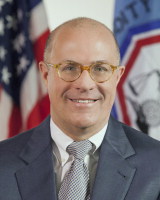A cross-section of regulators has formed a task force to coordinate virtual currency regulation in the US.
Here’s part of a statement made by the head of the Commodities Futures Trading Commission (CFTC), Christopher Giancarlo.

“The Treasury Secretary has been out front on this. He has formed a virtual currency working group of ourselves, the SEC, the FED, and (Treasury).” Giancarlo stated. “We’ve had a number of preliminary conversations and work streams developed. I’ve had a number of bilateral conversations with the Treasury Secretary (Steven Mnuchin) on virtual currencies. We are going to be coordinating our various responses. It’s begun with just some broad conversations just establishing our various jurisdictions so that we’re clear on what we’re doing and what we’re not doing: where the gaps are.”
Giancarlo was testifying along with the Chair of the Securities and Exchange Commission (SEC) Jay Clayton in front of the Senate Banking, Housing and Urban Affairs Committee in a hearing entitled: “Virtual Currencies: The Oversight Role of the U.S. Securities and Exchange Commission and the U.S. Commodity Futures Trading Commission.”
Clayton concurred with Giancarlo about a multi-agency task force to regulate virtual currency, “Let me start by recognizing the Treasury Secretary; he has brought us together – the SEC, the CFTC, the Fed, and Treasury – to talk about this.” Clayton said.” The funny thing about these crypto-currencies is they only work for their purported purpose if they’re integrated with the financial system. Therefore, it necessarily touches on all of our regulations.”
Earlier in the day, Switzerland-based Bank for International Settlements General Manager Agustin Carstens called bitcoin a “combination of a bubble, a Ponzi scheme and an environmental disaster.”
The hearing and the note by Carstens continue momentum for global regulators who are scrutinizing bitcoin and all virtual currencies.
Bitcoin briefly dropped below $6,000 after Carstens comments early in the morning in the US before recovering above $7,000 in the afternoon; it peaked at $19,783.21 on Dec. 17, 2017.
It has been on a slide since, in part due to scrutiny from numerous global regulators.
Clayton told Alabama Republican Senator Richard Shelby more legislation may be necessary to regulate virtual currencies.
“We may be back with our friends from Treasury and the Fed to ask for additional legislation.” Clayton said in response Shelby, who asked how the Congress can help.
Though, Clayton did not propose any legislation in this hearing.
Giancarlo made an interesting observation, noting that there may be a gender gap growing in virtual currencies.
“I’m the father of three college age children, a senior, a junior, and a freshman. During their high school years, we tried to interest them in financial markets. My wife and I set up small brokerage accounts with a few hundred dollars that they could use to buy stocks. Yet, on than my youngest son who owned shares in a video game company, we haven’t been able to pique their interest in the stock market. I guess they’re not much different than most kids their age. Something changed through the last year, suddenly they were all talking about bitcoin. They were asking me what I thought, and should they buy it. One of their older cousins, who owns bitcoin, was telling them about it and they got all excited.”
To illustrate the gender gap, one of the oldest members of Congress then spoke for his generation.
Richard Shelby is 83 and he noted, referring to the currency being virtual: “We live in a virtual world. You go to the doctor and they give you a virtual examination. We go here and its virtual. That was not my world. I started out with paper and pencil,” Shelby stated. “At same time, this currency- this crypto-currency- they lack intrinsic value, they lack liquidity.”
Both the CFTC and SEC have varying oversight roles over virtual currency.
Back in 2015, then CFTC Chair Tim Massad defined virtual currency as a commodity, and thereby put usurped a great deal of oversight to the Commodities Futures Trading Commission.
The CME featured its first virtual currency future in December 2017, and in July 2017, the CFTC approved LedgerX to operate the first US federally regulated exchange and clearing house for derivatives contracts settling in digital currencies.
Giancarlo has also been aggressive in investigating fraudsters, bringing three actions since the beginning of 2018.
Clayton noted that SEC oversight is limited. The SEC “regulates securities transactions and certain individuals and firms who participate in our securities markets. The SEC does not have direct oversight of transactions in currencies or commodities, including currency trading platforms.” Clayton said in his written statement.
The SEC has taken the lead in regulation of Initial Coin Offerings (ICO). “These offerings can take different forms, and the rights and interests a coin is purported to provide the holder can vary widely. A key question all ICO market participants – promoters, sellers, lawyers, officers and directors and accountants, as well as investors – should ask: ‘Is the coin or token a security?’ As securities law practitioners know well, the answer depends on the facts.” Clayton said. “But by and large, the structures of ICOs that I have seen involve the offer and sale of securities and directly implicate the securities registration requirements and other investor protection provisions of our federal securities laws. As noted above, the foundation of our federal securities laws is to provide investors with the procedural protections and information they need to make informed judgments about what they are investing in and the relevant risks involved. In addition, our federal securities laws provide a wide array of remedies, including criminal and civil actions brought by the DOJ and the SEC, as well as private rights of action.”
The SEC recently announced halted an ICO in “Arisecoin”, claiming it was fraudulent.









